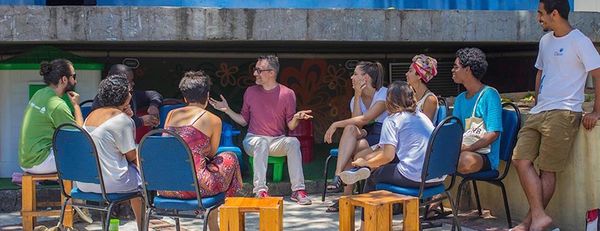Nîmes - February 2019/Session
 Introduction to Restorative Circles |
About this event[modifier]
Restorative Circles is a community process for supporting those in conflict, developed in the favelas of Brazil in the mid 1990s. This event is an introductory, interactive two-day session of demonstration and experiential learning presenting the Restorative Circles approach to justice.
Dominic Barter will present an overview of the key elements of a restorative system and the Circles they support. We will focus on the evolution and practice of the process, and its application to various types of conflict, ranging from family disagreements, group conflict, schools, workplace and social tensions, and criminal conduct.
Through exploration of key concepts, grounded in a step-by-step process and illustrated by real world examples, participants will envision and practice ways of bringing it to their own communities and institutions.
Dominic Barter[modifier]
Dominic Barter is internationally recognized as a pioneer in the field of restorative responses to conflict. He has spent over 20 years in the restorative field, developing empathic social technologies that promote dialogue and partnership. In the mid-1990s he co-developed Restorative Circles, a community based and owned practice for dynamic engagement with conflict forged in the gang-controlled shantytown favelas of Rio de Janeiro. He adapted the practice for the Brazilian Ministry of Justice's and State Education Departments’ award-winning national projects in Restorative Justice and has supported its spread throughout Brazil and in a further 40 countries, working with communities, courts, civil conflict, education, activists and government. In 2016 the work was recognized by a National Council of Justice resolution defining the roll out of RJ in courts at the federal level.
In the 2010s Dominic developed and directed the Dialogue Restoration project for the Rio State Education Department, and then the restorative system used in Rio’s notorious juvenile detention centres. He developed and supervised the mediation program for the ‘Police Pacification Units’ and served as invited professor at the Standing Group for Consensual Methods of Conflict Resolution, at the High Court of Rio. Dominic also served as president of the Board of Directors for the international Center for Nonviolent Communication and as a member of the International Advisory Board of the journal ‘Restorative Justice’. In 2015 he gave the opening keynote address at the 5th biannual conference of the US National Association Community and Restorative Justice (NACRJ), in Florida.
Dominic has also worked as a school teacher for 8 to 17 year olds, and is currently on the staff of Espaço Beta, an innovative high school based on relational intelligence.
Inclusion and Finances[modifier]
We invite all participants to Financial Co-responsibility for this event - a practice proposed by Dominic for consciously sustaining systems, projects and events without restricting participation for those with less access to money.
This event is neither charged nor free. During our time together we will share information on the costs of the event, the livelihood of the people offering it as a gift, and the projects they are engaged in. Then we will describe a simple mechanism for financial contribution to cover those costs, contribute to the livelihood of those creating the event and to sustain and expand the projects they do. These can be offered in cash or by check - we will not have the option of receiving contributions with credit cards. We will then calculate what was donated and let the group know. Afterwards, each person in the organization of the event will share what was contributed between them, in a circle process that seeks to care for the material well being of all involved.
For those that require financial support with transport and other simple costs to be with us on the day we will also use a simplified version of this same process to care for costs that might otherwise present restrictions on your participation.
Practical Details[modifier]
- Saturday 2nd of February from 9:30 to 18
- Sunday 3rd of February 9.30 to 17
- The venue will be in Nîmes, in a place accessible by train and bus.
- The email will be sent to you via e-mail when you confirm your registration.
To register[modifier]
Please register using this link :
